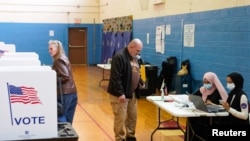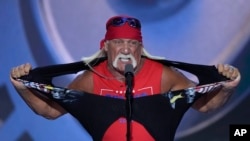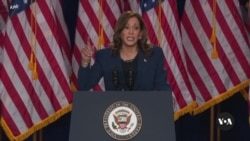
Russia, Iran and China are ramping up efforts to impact the outcome of the U.S. presidential election and down-ballot races, targeting American voters with an expanding array of sophisticated influence operations.
The latest assessment from U.S. intelligence agencies, shared Friday, warns that Russia remains the preeminent threat, with Russian influence campaigns seeking to boost the chances of Republican presidential candidate and former U.S. President Donald Trump over Democratic candidate Vice President Kamala Harris.
Russian actors, led by networks created by the Kremlin-backed media outlet RT, "are supporting Moscow's efforts to influence voter preferences in favor of the former president and diminish the prospects of the vice president," a senior intelligence official told reporters, briefing on the condition of anonymity to discuss sensitive information.
"RT has built and used networks of U.S. and other Western personalities to create and disseminate Russia-friendly narratives while trying to mask the content in authentic Americans' free speech," the official said.
And RT, the official added, is just part of a growing Kremlin-directed campaign that is looking to impact not just the race for the White House, but smaller elections across the United States, with an added emphasis on swing states.
"Russia's influence apparatus is very large and it's worth highlighting that they have other entities that are active," the official said. "Russia is working up and down ballot races, as well as spreading divisive issues."
Tracking the Russian influence efforts has become more difficult, with U.S. officials saying that there is a greater degree of sophistication and an increased emphasis on amplifying American voices with pro-Russian views rather than seeding social media with narratives crafted in the Kremlin.
"It's not just about Russian bots and trolls and fake social media persona, although that's part of it," White House national security spokesperson John Kirby told VOA Friday.
"We're not taking anything for granted," he added. "There's no question that [Russian President Vladimir] Putin has every intent to try to sow discord here in the United States, to try to pump disinformation and Russian propaganda through to the American people, through what he believes were our credible sources, be they online or on television and we have to take that seriously."
The intelligence officials declined to share additional specifics about Russia's network of influence operations. But indictments Wednesday from the U.S. Justice Department have shed some light on the scope of the Kremlin's recent operations.
In one case, the U.S. charged two employees of RT with using fake personas and shell companies to funnel almost $10 million to Tenet Media, a Tennessee-based company producing videos and podcasts for a stable of conservative political influencers.
The aim, prosecutors said, was to produce and disseminate content promoting what Moscow viewed as pro-Russian policies.
In a separate action, the U.S. seized 32 internet domains linked to an operation directed by a key aide to Putin. The aim, U.S. officials said, was to mimic legitimate U.S. news sites to spread Russian-created propaganda.
RT publicly ridiculed the allegations while some of the influencers working with Tenet posted statements on the X social media platform saying they were unaware of the company's links to Moscow.
As for the latest U.S. intelligence allegations, the Russian Embassy in Washington has yet to respond to VOA's request for comments, though it has described previous accusations as "Russophobic."
Requests for comment to the Trump and Harris campaigns have also, so far, gone unanswered.
But earlier U.S. intelligence assertions of Russian support for Trump have raised the ire of the Trump campaign, which has pointed to public statements by Russia's Putin supporting Trump's opponents.
"When President Trump was in the Oval Office, Russia and all of America's adversaries were deterred, because they feared how the United States would respond," national press secretary for the Trump campaign, Karoline Leavitt, told VOA in an email this past July.
U.S. intelligence officials, however, said it would be a mistake to put any faith in Putin's words, including public comments Thursday expressing support for Harris.
The U.S. intelligence community "does not take Putin's public statements as representative of Russia's covert intentions," the senior official said. "There are many examples over the past several years where Putin's public statements do not align with Russian actions. For example, his comments that he would not invade Ukraine."
Experts say Iran, China trying to influence results
U.S. intelligence agencies Friday emphasized Russia is not alone in its effort to shape the outcome of the U.S. elections in November, warning both Tehran and Beijing are sharpening their influence campaigns with just about 60 days until America voters go to the polls.
"Iran is making a greater effort than in the past to influence this year's elections, even as its tactics and approaches are similar to prior cycles," the intelligence official said, describing a "multi-pronged approach to stoke internal divisions and undermine voter confidence in the U.S. democratic system.
U.S. intelligence agencies previously assessed that Iran has focused part of its efforts on denigrating the Trump campaign, seeing his election as likely to worsen tensions between Tehran and Washington.
U.S. officials last month also blamed Iran for a hack-and-leak operation targeting the Trump campaign, though they said that Iran-linked actors have also sought to infiltrate the Harris campaign.
As for China, U.S. intelligence officials said it appears Beijing is still content to stay out of the U.S. presidential race, seeing little difference between Trump and Harris.
But there are indications China is accelerating its efforts to impact other political races.
U.S. intelligence "is aware of PRC [People's Republic of China] attempts to influence U.S. down-ballot races by focusing on candidates it views as particularly threatening to core PRC security interests," the official said.
"PRC online influence actors have also continued small scale efforts on social media to engage U.S. audiences on divisive political issues, including protests about the Israel-Gaza conflict and promote negative stories about both political parties," the official added.
'Malicious speculations against China'
The Chinese Embassy in Washington, Friday, rejected the U.S. intelligence assessment.
"China has no intention and will not interfere in the U.S. election, and we hope that the U.S. side will not make an issue of China in the election," spokesperson Liu Pengyu told VOA in an email.
Liu added that accusations Beijing is using social media to sway U.S. public opinion "are full of malicious speculations against China, which China firmly opposes."
While U.S. intelligence officials have identified Russia, Iran and China, as the most prominent purveyors of disinformation, they are not alone.
Officials have said countries like Cuba are also engaging in influence operations, though at a much smaller scale.
And other countries are edging closer to crossing that line.
"We are seeing a number of countries considering activities that, at a minimum, test the boundaries of election influence," according to the U.S. assessment. "Such activities include lobbying political figures to try to curry favor with them in the event they are elected to office."
Misha Komadovsky contributed to this report.
































